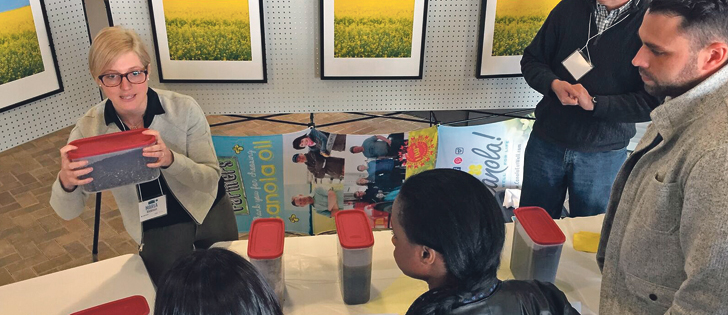Wrinkled noses and stunned looks washed across the faces of urban foodies when Marla Riekman and Don Flaten removed the lids and showed them what liquid and solid pig and dairy cow manure looks — and smells — like.
It wasn’t simulated manure — it was the real pooped-out stuff, collected just so the food bloggers and dietitians could get a full sensory experience of the oft-maligned nutrient source.
That’s what this particular interactive display was designed to do: take an aspect of agriculture that is often attacked by the Facebooking urban masses and explain to a set of educated, informed food ex-perts how it is actually a beneficial product.
Read Also

Farming Smarter receives financial boost from Alberta government for potato research
Farming Smarter near Lethbridge got a boost to its research equipment, thanks to the Alberta government’s increase in funding for research associations.
Beyond up-close interaction with manure, the attendees at the CanolaConnect Community Summit got to meet real farmers, talk to real agronomists and get a much better sense of how farmers farm and food such as canola is grown and harvested.
The summit was part of a continuing campaign by the Canola Eat Well For Life team, which promotes the use of canola oil and products not through direct product advertising but by making close connections with food professionals across the country, from food bloggers to chefs to nutritionists and dietitians.
The team, funded by Manitoba, Saskatchewan and Alberta canola grower groups, organizes events that aren’t designed to hit the maximum number of attendees but instead focus on key sources of food information that urban consumers trust.
Not only are these key sources a great way to get canola’s positive health affects out to the public, but the food professionals don’t be-come easily sidetracked by the sorts of divisive issues that often fill the food fears that can dominate spaces such as Facebook.
Issues such as manure, pesticides, genetically modified organisms and soil conservation can be discussed and addressed without the escalation of fear that is common when the issues begin bouncing around in social media.
And if they can get a better sense of how these practices, products and substances actually work in agriculture, it’s believed that they will be able to talk about it with their own followers, readers, customers and clients.
Canola oil is generally believed to be a healthy product and is generally produced in a sustainable manner, which means telling that story to educated people is likely to be effective.
The earthy, organic nature of agriculture was made pretty clear by the manure display.
“Uhhhhh, I just had lunch,” said one Toronto dietitian, backing up a couple of steps from the just-opened container of manure that a mischievously grinning Don Flaten, a University of Manitoba soil scientist, was urging her to look at closer.
And a respectful distance soon grew between the foodies and Riekman, a Manitoba Agriculture soil management specialist, with her array of half-a-dozen types of manure.
But while the manure display might have been a bit too richly pungent and surprising for some, it nicely encapsulated the event’s attempt to break through the wall of digital chatter that often divides urban people from farmers and the crops they grow.
Plus it woke up everybody feeling drowsy after lunch.


















